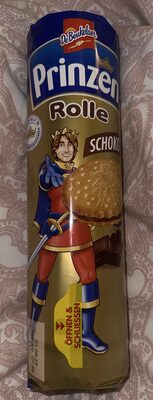
Barcode: 4001518117316
Prinzenrolle
HALAL
📝 Reason: Based on ingredient label and provided ECode mappings, none of the listed ingredients are Haram or Doubtful for Halal purposes according to IFANCA and other leading Halal certifiers. No meat or animal-extracted content is present. Vegan/vegetarian labeling further supports Halal status (Quran 5:3, IFANCA, halalfoodmaster.com).
🏷️ Category: Snacks, Sweet Snacks, Biscuits And Cakes, Biscuits And Crackers, Biscuits, Chocolate Biscuits
📄 Certificates: Sustainable, Vegetarian, Sustainable Palm Oil, Vegan, European Vegetarian Union, No Colorings, No Flavour Enhancer, Rainforest Alliance, Roundtable On Sustainable Palm Oil, Vegetarisch
Ingredients:
Details
Understanding the Halal Status of Prinzenrolle
When it comes to snack choices, the Halal status is a crucial consideration for many consumers. In this detailed exploration, we will delve into the widely loved Prinzenrolle biscuits to determine their Halal status.
According to our analysis, Prinzenrolle is indeed classified as Halal. Based on the ingredient list and effective E-number mappings, no components within this product are Haram or doubtful.
Ingredients Overview
Let’s break down the ingredients of Prinzenrolle:
- Wheat flour: A Halal plant-derived product. Learn more.
- Sugar: Typically Halal, although sugar processed with bone char could be doubtful. However, in Europe, the sugar sourcing is generally Halal. Read more.
- Palm fat: This is Halal and vegetable-based, ensuring it is not processed with any animal derivatives. Details here.
- Wheat starch: Another Halal ingredient, derived from plants. More info here.
- Low-fat cocoa powder (5.5%): Cocoa products are derived from cocoa beans and are always Halal. Find out more.
- Glucose syrup: Usually made from wheat, potatoes, or corn, all of which are Halal. Detailed information here.
- Dark chocolate (2.3%): The ingredients incorporate cocoa mass, sugar, and emulsifier (lecithin), which is generally plant-derived unless stated otherwise. Learn more.
- Raising agent (ammonium carbonates, sodium carbonates): Both types are synthetic and Halal. More on this.
- Salt: Being a mineral, salt remains Halal. Further readings.
- Pea protein: Derived from plants and is thus Halal. Explore here.
- Emulsifier (lecithin): Typically sourced from soy or sunflower in the EU, which supports its Halal status; any animal-sourced lecithin is considered doubtful, but labeling suggests plant-sourced here. More info.
- Acidity regulator (sodium carbonate): As a mineral, sodium carbonate is also Halal. Learn more.
Brand and Certification Context
Prinzenrolle is part of a recognized category of snacks, specifically biscuits and chocolate biscuits, appealing to a diverse audience. It carries several certifications, including sustainable practices, vegan labeling, and vegetarian approval. The certificates such as the European Vegetarian Union, Rainforest Alliance, and others reinforce its commitment to quality and ethical sourcing.
In conclusion, those seeking Halal-certified snacks find Prinzenrolle to not only taste delicious but also align with Halal dietary requirements. Its transparent ingredient sourcing, multiple certifications, and absence of any dubious components solidify its position as a trustworthy choice for consumers who adhere to Halal dietary practices.
